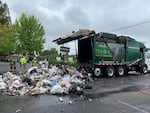Portland is making it easier for many residents to recycle batteries at home.
This month, the city’s Bureau of Planning and Sustainability launched a new curbside battery recycling service to help people get rid of batteries safely. Residents who get curbside service and live in a house, duplex, triplex or fourplex can now put unwanted batteries that fit into a sealed clear bag inside their glass recycling bin for pick up.
The bureau’s solid waste and recycling manager, Eben Polk, said the goal is to help keep batteries out of the regular waste system and reduce battery fires in garbage trucks and recycling centers.
“So many of us have like that junk drawer at home, maybe with some batteries in it and we don’t really know what to do with those,” he said. “They can be a bit of a nuisance.”

In this provided photo, a Waste Management garbage truck load fire during curbside pickup in Beaverton in 2021. Waste Management spokesperson Jackie Lang said batteries, barbeque coals not properly put out or fireworks are likely culprits for truck fires. Battery-caused fires have especially increased over recent years. “Batteries are everywhere today,” Lang said. “That creates a safety challenge that we haven't necessarily experienced before.”
Waste Management / Waste Management
Residents should be aware of what kind of batteries they will be recycling. If the batteries are labeled alkaline, they can go into a quart-size clear bag. If a battery is not labeled as alkaline, residents should tape both ends of the battery with clear tape before putting it into the bag.
Loose lithium-ion batteries are okay to recycle. Devices with built-in batteries are not accepted in the curbside service, however.
“Watch out for hidden batteries too,” Polk said. “If you have gadgets that make noise or light up or heat up or move around and they don’t plug into a wall, it probably has a battery in there. So that’s not something that really should go in your trash or mixed recycling.”
Those include wireless devices like fitness bands, electric toothbrushes, cell phones, laptops, vape pens, e-cigarettes, some toys, and even “singing” birthday cards, cannot be recycled. These types of items can be safely recycled at any Metro garbage, recycling and hazardous waste facility.
Polk is hopeful this new program will help people recycle batteries more responsibly.
Over the last five years, lithium-ion battery-caused fires are up 40% across the nation, according to a study by the National Waste & Recycling Association. The study also suggested lithium-ion batteries are responsible for more than 5,000 fires in recycling facilities.
“Batteries are everywhere today,” Waste Management spokesperson Jackie Lang said. “That creates a safety challenge that we haven’t necessarily experienced before.”
Because batteries are found in almost everything, most are not properly recycled, Lang said. That leads to truck drivers and warehouse employees exposed to injuries more frequently, she said.
Just this month, a Southeast Portland Waste Management truck driver experienced a fire caused by something collected at curbside.
“The driver smelled smoke early and was quickly able to pull over and dump the load in a school parking lot,” she said. “This was a safe location because school had not started for the day yet, but the situation clearly could have been more dangerous.”
Lang said the likely suspects are batteries, barbeque coals not properly put out or fireworks. Usually, truck fires are traceable. But when there is a fire either in a truck or at a facility, it hurts the whole community, she said.
“It adds to the cost of managing garbage and recycling,” she said.
For the past two years, Metro’s Oregon City transfer station has seen an average of one fire every eight days, said Metro’s public information officer Gia Ballash.
“It is a frequent issue,” she said. “We can’t always say that those fires are because of batteries, but more often than not, they are the likely culprit.”
Ballash said Metro facilities often receive a wide range of lithium-ion powered devices, like cell phones, laptops, tablets, electric toothbrushes, household power tools, electric bikes or scooters and electronic vapes. She said those are some of the most common items that cause fires.
Lithium-ion batteries short circuit over time, Ballash said or if they get wet or punctured in a garbage truck, it can combust and start a fire. Fires can also start in sorting facilities as garbage is moved into a compactor and crushes a battery.
“A good rule of thumb is that if you have an electronic device that is rechargeable more often than not, it’s being run with a lithium-ion battery,” Ballash said.
Correction: The story has been updated with the correct name of Eben Polk, solid waste and recycling manager of Portland’s Bureau of Planning and Sustainability. OPB regrets the error.
